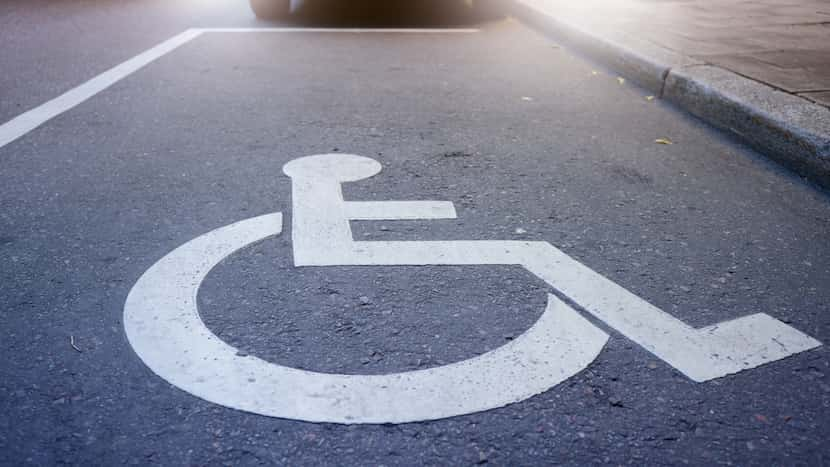My friend and I were running errands. I was in the passenger seat and as she was parking the car I started to panic. As I got out my heart started racing. I looked around to see if anyone was seeing us. I held my breath until we got into the store.
You see, we parked in a handicapped parking spot. My friend had a handicapped parking pass for medical reasons. But she had no visible disability. No wheelchair, no cane, no crutches, and no limp. In fact, she looked like a healthy human being with no visible signs of disability whatsoever.
In my work as a disability and accessibility advocate, I know what happens when a young, seemingly healthy person parks in a handicap spot. And it’s ugly. Unofficial handicap parking guards can be downright nasty when they fail to notice visible signs of disability.
Jeremy Andrew Davies, a co-author of this editorial, posted a video about the disabled parking scam to social media, where it garnered over 3,000 comments. Clearly, the video has touched a nerve in the disability community, and these comments capture the feelings of many like them.
Among the comments, stories of frequent harassment were the most common, with some common themes:
“I have multiple disabilities and I was often yelled at for using the placard,” “The store staff bombarded me with questions about why I was using it,” “I’m one-legged but they still get annoyed, saying, ‘You walk so well,'” and “You’re in a wheelchair. You don’t need to park close by. You can roll to your car.”
Yes, even people with obvious disabilities, such as those with prosthetic limbs or who use wheelchairs, are subject to harassment.
Many of the things people shared point out how ignorant society is about how disabilities manifest and who needs handicapped parking — from invisible disabilities, to being told you’re too young to be disabled, to not understanding why accessibility is important beyond mobility.
“They told me I was 22 and couldn’t feel pain”, “I was diagnosed with MS when I was 20 and the harassment I received was horrible”, “They seem fine when they walk into the store but when they walk back to their car they look completely different”, “I’m autistic and a flight risk. Having access to disabled parking means I don’t have to run out into the street to get to my car or safety.”
And opponents of handicapped parking permits argue that it’s too easy to get one. But quite the opposite is true: Doctors who prescribe handicapped parking permits to people who don’t need them could lose their license.
“I work for a doctor but he only issues me a pass about once a year. It takes a lot of paperwork.” “It took my grandmother 30 years to get a pass. She had cancer twice and couldn’t walk long distances. She seemed fine.” “I had major knee surgery and can’t walk so I couldn’t get a pass!” “I have paralysis attacks and when I have attacks I am physically unable to move around without a wheelchair and still don’t qualify.”
The different types of harassment people experience often cause people who need disabled parking to avoid using it.
“This is why my husband, who has cancer, never uses his placard or wheelchair in the shops.” “This goes back to all the reasons why I never tried to get a pass – I have MS and hypermobility and don’t want to be associated with judgemental people.” “My mum didn’t even reapply for her pass because people got so upset because she seems fine – she has rheumatoid arthritis.” “I can’t use my pass when my daughter is around because I would be scared she’d see it and be in danger if someone came to help me.”
Read your last comment again – imagine being harassed to the point that you hesitate to use your pass because it could put your family at risk – this is exactly what those who qualify for disabled parking face.
Just because the icon for a disabled parking spot is a wheelchair does not mean that only people who use wheelchairs can use the parking spot. There are many disabled people who do not use wheelchairs who can use the parking spot.
Most disorders are not immediately obvious. Can fibromyalgia be diagnosed at a glance? Herniated discs? Cancer? What about lupus, epilepsy, sarcoidosis, osteoporosis, complex regional pain syndrome, traumatic brain injury, diabetes, multiple sclerosis?
There are many diagnoses that qualify for a handicapped parking permit yet appear “healthy.”
Disabled people have been yelled at, stalked, called names, given mean looks, questioned about their medical justification, etc. These are the exact reactions and comments that I was scared of when my friend parked in a disabled spot.
Don’t harass people who use handicapped parking or bathroom stalls. They may have cancer. Self-appointed police have the opposite effect of helping people with disabilities. The best way to help is to do your job and say nothing. Thank you for not trying to police handicapped parking, bathrooms, or anything to do with accessibility.
And don’t call the police. According to the U.S. Department of Justice, crime against people with disabilities is four times higher than against people without disabilities. But that’s another story.
Jeremy Andrew Davis is a disability advocate, speaker, consultant and film writer/director. Merrill K. Evans is a speaker, disability advocate and accessibility consultant.
We welcome your thoughts in letters to the editor. Please review our guidelines and submit your letter here. If you have any problems with the form, please email us at [email protected].

